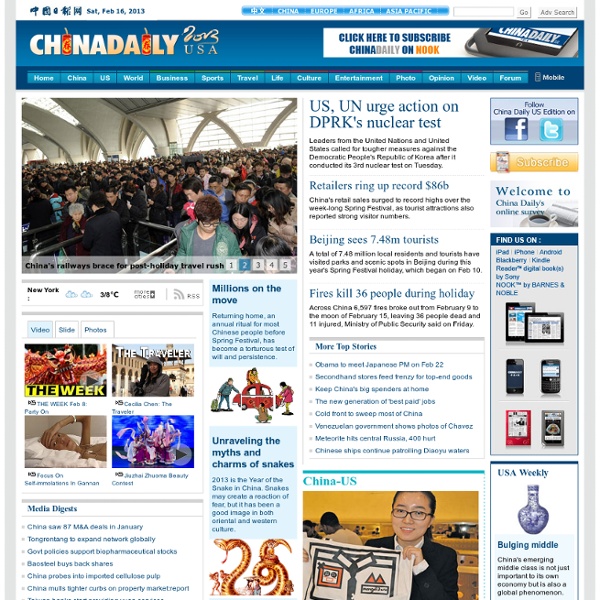English translation of 不客气 / bú kèqì / bu keqi - don't mention it in Chinese
Phonetic script (Hanyu Pinyin) Listen to pronunciation(Mandarin = standard Chinese without accent) You're listening to the natural voice of a native speaker of Mandarin Chinese. English translations don't mention it, unkindly, to be rude to, unkindness, you're welcome, my pleasure, you are welcome, don't be so polite
China News
30 min ago | The Economist Urbanisation: Where China's future will happen For the world's sake, and its own, China needs to change the way it builds and runs its cities "A GREAT city", said Benjamin Disraeli, "a is the type of some great idea. Trending on the Topix Network 4 hrs ago | MarketWatch Nike, Adidas warily eye latest round of labor protests in China
Insane Leverage at the People's Bank of China.
Today, China is the world's great creditor nation. The Chinese produce and save, the West borrows and consumes. Or so the story goes. In a fiat currency system, money is debt. Because China has the most fiat money in the world, that means the Chinese economy also has the most debt. The stereotype of the thrifty Chinese person is true.
Chineasy: The easiest way to learn Chinese by ShaoLan Hsueh
Because we make learning Chinese…easy! Sorry for the pun. Seriously though, it works!
The Most Valuable Money Supply in the World.
While no one seemed to be watching, the money supply of China snuck past the U.S. Dollar, the Japanese Yen, and the Euro to become the most valuable money supply in the world. According to each central banks’ official statistics, it reached first place in September, 2011.
The glittering goldfields of southeastern Australia : History, Australia
The discovery of gold in the early 1850s sparked pandemonium in Victoria, Australia, then an unremarkable colonial frontier full of sheep farmers. Thousands of prospectors from Europe, North America and China flocked to southeastern Australia with the hope of becoming the most profitable fortune hunter. Related article: New riches along the White Pass and Yukon Route
A Walk Through the Chinese Money Supply.
For all of its faults, the Federal Reserve is a very transparent bank, at least when it comes to sharing the very mundane data about the money supply and financial system. Even us anti-central banking advocates have a special place in our hearts for Uncle Fred and Grandpa Fraser at the St. Louis Federal Reserve Branch.
China and Japan Getting Away From Dollars
The run on the dollar that could sink its value and bring surprise hyperinflation to the U.S. has just become a lot more likely. China and Japan are moving to trade each other’s currencies directly rather than use the U.S. dollar as an intermediary. This won’t lead to an immediate shift away from the dollar.
New 'parallel revolution' against corruption
London, UK - As the year of revolution draws to a close, a new "parallel revolution" against corruption is emerging in Yemen. Over the past two weeks strikes have spread across the country and are proving effective, leading to the hope that this Yemeni uprising of 2011 can truly bring change to the Arab world’s poorest country. The chant of "Irhal, Irhal" - "Leave, Leave" - is now being directed at corrupt figures of authority throughout the country.
China’s micro tuning to macro policy
Is the People’s Bank of China’s decision to cut the reserve ratio required of commercial banks a signal for investors to head off to the races? Not so fast, some say. BofA Merrill Lynch economist Ting Lu says it’s not a turning point in the monetary policy stance, but merely another instance of policy fine-tuning. And while it’s unambiguously positive to markets, one shouldn’t expect interest rate cuts to follow.
China manufacturing slowing, data show - Economic Report
By Chris Oliver, MarketWatch Reuters A worker at a textile factory in Yiwu, China. HONG KONG (MarketWatch) — Rival surveys released Thursday confirmed manufacturing activity in China slipped into contraction in November, with analysts saying the slowing is pushing Beijing towards easing monetary policy to support growth. The state-sponsored China Federation of Logistics & Planning reported its manufacturing Purchasing Managers’ Index fell to 49.0 on a 100 point scale, falling below the previous month’s 50.4 reading.
5 money moves one China bubble-buster is making - Money Talks
By Laura Mandaro, MarketWatch SAN FRANCISCO (MarketWatch) -- Investing’s holy grail, spotting a bubble before it busts, may be two parts science, one part art and a large dose of luck. In the brew concocted by Vikram Mansharamani, a former private-equity investor and current Yale University lecturer who recently penned a book on the subject, a range of hard and soft indicators from ballooning credit to record art prices have been raising Chinese bubble flags for the past year. Bachrach Vikram Mansharamani. But he has some ideas on where to find refuge if the Chinese growth engine slows from around 9% to 4% -- his projection for the country’s average growth rate over the next decade.



